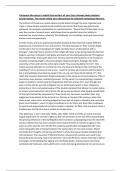Compare the ways in which the writers of your turn chosen texts explore
social status. You must relate your discussion to relevant contextual factors.
The authors of these two novels explore social status through the lens of gender and
class in times where upward social mobility was limited but there was great social
upheaval, for example urbanisation on mechanisation. ‘Tess of the D’Urbervilles’ is set
over the course of several years, and shows how her gender harms her ability to
maintain her social status, whereas ‘Mrs Dalloway’ is a circadian novel and view social
status more retrospectively.
In both novels, there are patriarchal double standards that exist that create di erent
experiences of society for men and women. The best example in ‘Tess’ is when Angel
confesses to his sin of plunging into “eight and forty hours of dissipation with a
stranger”, relieving ‘Tess’s worries of how Angel will react to her being raped by Alec but
Angel’s reaction is devoid of sympathy and leads to Tess being abandoned. Throughout
their relationship, Tess’s guilt about her secrecy was the driving factor in her hesitancy
towards accepting Angel’s advances despite reciprocating his feelings. She feels
unworthy of him and tells the other dairy maids “You would be better for him”. She
makes several attempts to confess her sins, the final one being on the morning of the
wedding (“I am so anxious to talk to you. I want to confess all my faults and blunders!”),
but is immediately shut down by Angel (“No, no, we can't have faults talked of”). The
relief she therefore feels when Angel confesses to the same sin of premarital sex (“No, it
cannot be more serious, certainly because ‘tis the same”) is overwhelming. However,
Angel is unable to reciprocate the forgiveness that Tess shows him, even though she
was a victim and he was the instigator and an active participant in their respective
interactions. He is somewhat aware of the double standard that allows his social status
to remain untarnished but ruins Tess’s life, as he worries about what people would think
of Tess (and himself by association) if they found out, but never considers that, any
judgement may extend to his actions too. Women in the late 19th century, when this
novel is set, were victim to being judged for their lack of virtue or chastity, but men were
given more freedom - even if it was considered a sin for them too. Even Alec is allowed
to repent and supposedly be turned by religion, however, for Tess, that one event casts a
shadow over her life that she is unable to escape from.
‘Mrs Dalloway’ is set in the early 1920s, after WW1 (1914 to 1918), an event that was
hugely significant for women's rights as the role of women in the war e ort exacerbated
the growing influence of the Su ragettes who had been campaigning since the late 19th
century. Whilst this may have created some improvements in women's rights in law,
such as white women over 30 with the property qualification being granted the vote,
much inequality still remained between the social class of men and women. Woolf
contrasts the thoughts of Clarissa and Peter to show the sexual double standard that
still remained. The news that “Millicent Bruton, whose lunch parties were said to be
extraordinarily amusing, had not invited her”, but only Richard, causes Clarissa to spiral
and begin contemplating her ageing and inevitable death. Clarissa fears becoming
outdated and irrelevant, and Lady Bruton's invite not being extended to her serves as an





